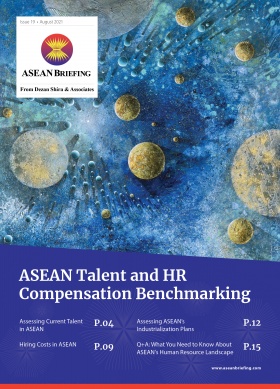Cambodia to Increase Minimum Wage for 2022
On September 28, 2021, Cambodia’s Ministry of Labor and Vocational Training (MLVT) issued Prakas 264 which sets the new minimum wage for the garment, textile, and footwear industries for 2022. Unlike other countries, Cambodia’s minimum wage rates only apply to these industries.
Under Prakas 264, workers in the garment, textile, and footwear industries will be afforded the following minimum wages:
- Regular workers – US$194 per month (an increase from US$192 in 2021); and
- Probationary workers – US$ 192 per month (an increase from US$187 in 2021).
Prakas 264 also sets out the minimum wage for piece-rate workers who are paid by the number of textile/garment/footwear pieces they produce. For such workers, the pay rate is determined by their level of production and if this results in the worker earning more than the minimum rate, then that worker will be entitled to that higher amount. However, if their production brings in a pay rate lower than the minimum wage, the employer must adjust the worker’s pay to equal to the minimum wage.
Cambodia’s minimum wage is regulated under the Minimum Wage Law. Which was promulgated in 2018. Under the law, the government must look at certain factors to determine the new minimum wage, which includes inflation rates and living expenses, industry productivity, and the current job market.Prakas 264 will come into effect on January 1, 2022.
What other benefits are workers entitled to?
In addition to a minimum wage, workers in the garment, textile, and footwear industries are also entitled to:
- Attendance bonus — US$10 per month;
- Transportation or accommodation compensation — US$7 per month;
- Food allowance — US$0.50 per day (or one free meal per day);
- Overtime and seniority bonus — US$2-US$11 per month for those between their second to the eleventh year of work.
Vital industries
Cambodia’s garment, textile, and footwear industries are vital to the country’s economy, as they account for some 80 percent of total exports — exporting over US$7 billion worth of products annually before the onset of the pandemic. The industries also employ over 700,000 workers, making them Cambodia’s largest employer.
The increase in minimum wages has long been a balancing act for the government who is keen to keep costs low for investors and businesses while also trying to satisfy influential unions who have held strikes in previous years.
In 2014, Cambodian garment workers protested to increase the minimum wage from US$100 to US$177 per month. Since then, the government has steadily increased the minimum wage. Representatives of national unions had asked for an increase to US$204 per month although this was ultimately declined.
Cambodia is also still reeling from the withdrawal of its partial withdrawal of ‘Everything but Arms’ (EBA) status by the European Union (EU), which gave the country duty-free access to EU markets. This means Cambodian-based exporters are now subject to full tariffs of up to 30 percent on products bound for the EU — impacting some US$1 billion of the country’s exports.
About Us
ASEAN Briefing is produced by Dezan Shira & Associates. The firm assists foreign investors throughout Asia and maintains offices throughout ASEAN, including in Singapore, Hanoi, Ho Chi Minh City, and Da Nang in Vietnam, Munich, and Esen in Germany, Boston, and Salt Lake City in the United States, Milan, Conegliano, and Udine in Italy, in addition to Jakarta, and Batam in Indonesia. We also have partner firms in Malaysia, Bangladesh, the Philippines, and Thailand as well as our practices in China and India. Please contact us at asia@dezshira.com or visit our website at www.dezshira.com.
- Previous Article Globaler Mindeststeuersatz für Unternehmen: Auswirkungen auf Singapur
- Next Article The Enhanced Regional EU-ASEAN Dialogue Instrument








